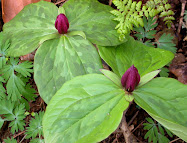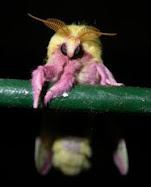These are old photos that I would like to share because they tell a interesting story -- the photo story of the birth of a dragonfly. Unfortunately I don't have the complete set of photos for one species so I have combined them to demonstrate this part of their life cycle. So how do they get from this creepy looking nymph that crawls around the pond, lake, stream floor eating everything it can catch ...
...to this beautiful dragonfly.
To begin with the nymph crawls out of the water and attaches itself to some sort of vegetation or hard surface. I have seen them on plants and on trees next to the waters edge. In fact I have even seen them on an old umbrella that was tossed into a small pond. They don't seem to be too picky.
Below is a small series of photos I took of an Emerald emerging.
You can see that it first attached itself to what I thought was a plant but upon closer inspection realized that is was attached to a exoskeleton (exuviae) of a previously emerged dragonfly. Like I said they don't seem to be picky. At this site there were hundreds of them emerging or had emerged earlier that morning.
The back of the exoskeleton cracks open and the adult form sort of pushes its way out and then hangs on while it pumps blood plasma into its wings to expand them, similar to a moth or butterfly.
This one is has its wings expanded and is letting them air dry and harden. They are most vulnerable at these early stages of their life. Those white string like things are spiracle tubes that the larva use to breath. They seem to be the last thing that is released as the adult emerges.
Below is one that has fluttered away from the exuvia and is hiding on the ground. At this stage, the teneral stage, you can see the wings are very shiny and soft. They are still very easy to catch but can be difficult to identify because some of the colors and markings have not fully developed yet. In a few hours, once the wings have hardened, this one will be almost impossible to catch.
Below are other views of exuvia. With the right key you can figure out what species emerged or at least what genus.
Below are some adult photos I have taken over a few years.
Cobra Clubtail - Gomphus vastus
Common Whitetail - Libellula lydia
Ebony Jewelwing
Yellow-legged Meadowhawk - Sympetrum vicinum
Variable Damselfly
Twelve Spotted Skimmer
See more watery places at Watery Wednesday.






















+DSCN5800+for+blog.jpg)

4 comments:
What a coincidence that I found one today...lead me back to your blog. awesome!! jek
Joan, thank you. I take photos of EVERYTHING even if I don't know what it is now, I can find out later. You just never know what miracles can happen in nature.
Outstanding series of photos. Thanks for the info
Exuvia is one of my favorite words. I even taught my 2-year-old to say it, which is pretty cute. fabulous photos as always!!
Post a Comment